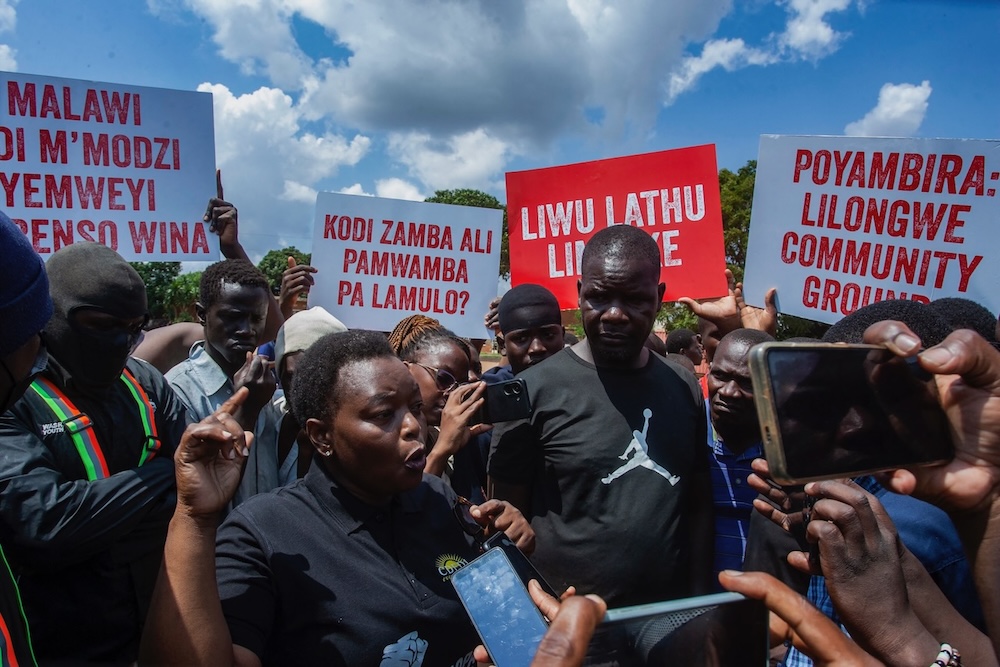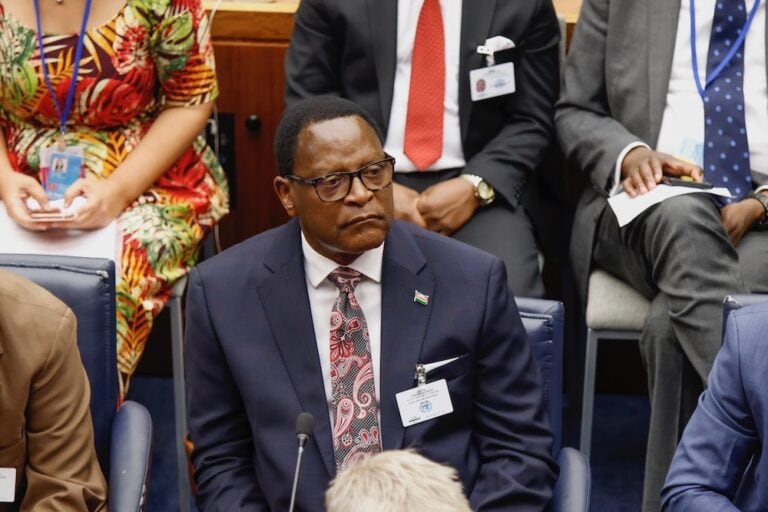As Malawi heads towards elections later this year, stakeholders are urged to uphold media freedom and freedom of expression, to ensure a safe environment for both journalists and citizens.
This statement was originally published on malawi.misa.org on 1 January 2025.
Malawi government must stop watching as some people are intimidating and injuring those expressing themselves.
MISA Malawi would like to thank the membership, partners/sponsors, the government of Malawi and the general public for supporting its efforts to promote media freedom, freedom of expression and access to information in 2024.
We ended the year with many great cheerleaders in you and we look forward to more years of working together for a resilient and sustainable democracy in Malawi. Here are our end-of-the- year reflections:
A. Positive developments
- Dedicated membership, solid partnerships and renewed commitments
By subscribing to MISA Malawi ideals and participating in all our activities, the membership expressed commitment to free and independent media, free expression for everyone and transparent and accountable systems.
By supporting us technically and financially, partners/sponsors helped us achieve great milestones in media capacity building and advocacy. We were able to train journalists in different thematic areas and reached out to different communities with our advocacy programmes because of generous support from our partners.
By treating our membership to a World Press Freedom Day Breakfast at Kamuzu Palace in May and supporting us in different ways, His Excellency the President Dr. Lazarus Chakwera indicated his government’s commitment to media freedom in the country.
By inviting us to appear and outline latest developments in the media sector before the Parliamentary Committee on Media, Information and Communication, Parliament of Malawi demonstrated its confidence in our mandate in the process of law reform for a better democracy.
By participating in our fundraising activities and advocacy work, members of the general public and corporate sponsors displayed their commitment to the sustainability of MISA Malawi work.
- Access to Information
In news that delighted MISA Malawi, in May, the Malawi Human Rights Commission (MHRC) ordered Ministry of Foreign Affairs to comply with an Access to Information Law request by Nation Publications Limited (NPL) journalist Suzgo Chitete. Chitete’s initial request for information on staff and diplomats in Malawi’s foreign missions was rejected by the Ministry on grounds that the information may compromise national security. However, the Commission ruled that the Ministry of Foreign Affairs “has not provided evidence that the personal information of the diplomats and other personnel can compromise the national security of Malawi.” The Commission added: “There is no clear causal relationship between the information that is being sought and the prejudice which might occur in any way”. Of course the Ministry failed to comply with the order.
- Broadcasting diversity
In the broadcasting sector, 2024 started on a positive note with the Malawi Communications Regulatory Authority (MACRA) allocating radio frequencies to more radio stations. This is after about two years of not allocating new frequencies amidst revocation of licences due to delayed payments of licence fees. The development means we are on the right track in our quest to achieve pluralism and diversity of views and opinions in broadcasting.
B. Negative developments
Sadly, 2024 will be remembered as the year when violence, intimidation and the Cybersecurity law were used to suppress critical voices. State actors such as the police, the army, the courts, political parties and some non-state actors took turns in violating media freedom, restricting freedom of expression and shrinking the civic space.
- Media freedom violations
The pattern of attacks on journalists in the year under review can easily be construed as deliberate to muzzle, frustrate and even destroy the free and independent media in Malawi.
- In January, Journalist Gregory Gondwe of the Platform for Investigative Journalism (PIJ) went into hiding, on advice from military sources, following his expose’ on the payments that Malawi Defence Force (MDF) made to businessman Zuneth Sattar, a fraud suspect under the Anti-Corruption Bureau (ACB) probe.
- In February, police confiscated mobile phones and laptops from over 14 Malawi Broadcasting Corporation (MBC) journalists for alleged offenses committed under the Electronic Transactions and Cybersecurity Act. This followed a complaint by MBC Management. The gadgets were later returned to the owners without any explanation.
- In April, three supporters of Mighty Mukuru Wanderers Football Club assaulted Television Islam reporter Yasin Limu during a Super League of Malawi (SULOM) match at Kamuzu Stadium. In the assault, a TV Islam camera tripod and Limu’s wrist watch were damaged.
- In April, police detained journalist Macmillan Mhone over a story that an online news site Malawi24 published in August 2023. Police transferred Mhone from Blantyre to Malawi Police Service Headquarters in Lilongwe, a distance of over 300 kilometres.
- In August, police stopped Nation Publications Limited crew from using mobile phones in livestreaming the Malawi Congress Party (MCP) convention which President Dr. Lazarus Chakwera attended.
- In August, some people operating under the banner ‘DPP media team’ during the party national convention at COMESA Hall in Blantyre threatened and ‘forced’ the Nation Publications Limited team to delete a Facebook news update on what was happening at the convention.
- In August, Times Group reporter Cathy Maulidi received WhatsApp threats from strange numbers over a story on what Minister of Tourism Vera Kamtukule said in Parliament. There were also social media trolls against Maulidi over the same story.
- In November, some people attacked some journalists at a football event at Civo Stadium in Lilongwe.
- In December, officers from Blantyre Police Station detained Times Group journalist Isaac Salima and forced him to delete pictures and videos of a fracas at the Southern Region Headquarters of the Directorate of Road Traffic and Safety Services.
- Restrictions on Freedom of Expression using the Cybersecurity Law
In 2024, the Electronic Transaction and Cybersecurity Act of 2016 was actively used as a tool of silencing and intimidating critical voices. A number of Malawians, including journalists, were arrested and ill-treated for allegedly contravening the Electronic Transactions and Cybersecurity Act. Some people were even convicted for expressing themselves, especially online. What was even more concerning was the way police ill-treated some of the suspects by moving them from places of arrests to police stations hundreds of kilometres away from their respective homes.
- In May, a Magistrate’s Court in Dowa district convicted and fined Sainani Joshua MK200,000 ($115) for ‘insulting’ President Dr. Lazarus McCathy Chakwera. Joshua is said to have committed the offence in a WhatsApp group called Mponela Hotspot. He was convicted on May 16, 2024 on cyber spamming charges contrary to section 91 of Malawi’s Electronic Transactions and Cybersecurity Act of 2016. He had been remanded to prison for about two weeks prior to the sentencing.
- In June, police arrested Rumphi East Member of Parliament Kamlepo Kalua in Blantyre and transferred him to Lilongwe for allegedly producing an offensive Voice Note (VN) on the death of Vice President Saulos Chilima and eight others.
- In June, police arrested activist Bon Kalindo in Salima district and transferred him to Lilongwe for allegedly producing an offensive VN on the death of Dr. Chilima and eight others.
- In June, Reverend Kondwani Chimbilima Gondwe of Zolozolo CCAP in Mzuzu was arrested and taken to Lilongwe for allegedly producing an offensive VN on the death of Chilima and eight others.
- In June, a music producer, Chiyanjano Mbedza, was arrested for being suspected to be behind a Facebook content platform called ‘Bakili Muluzi TV’.
- In July, an old man named Dyson Mhone was arrested in Mzimba, transferred to Lilongwe and got remanded at Maula Prison for over 1 month for allegedly sharing on WhatsApp a video deemed ‘insulting’ to President Chakwera. The magistrate’s court in Lilongwe found that charges against Mhone were not clear and proceeded to commit the matter to the High Court for review.
- In October, Moses Shumba, a Pastor, was convicted and sentenced to 10 months’ imprisonment (suspended to 18 months) for spreading what the prosecutors called ‘offensive Voice Notes’ on the death of Dr. Saulos Chilima and eight others.
- Intimidation, violence against right to assembly, state inaction
- In February, masked people with stones, panga knives and catapults injured and dispersed Democratic Progressive Party (DPP) supporters who gathered at Mbowe Filling Station in Lilongwe for their party parade.
- In November, some ‘unknown’ panga wielding individuals twice dispersed protesters in Lilongwe in the presence of law enforcers.
To date police have not questioned or arrested anyone on such barbaric acts of violence and assault on constitutional right to assembly.
C. Our calls:
- Police must end impunity on crimes against journalists. Arresting and prosecuting those who attack journalists will send a strong signal to would-be offenders.
- Police must stop transferring people from their districts of residence to Lilongwe for court appearances in cyber-related crimes.
- Government must review the Electronic Transactions and Cybersecurity Act as a matter of urgency to ensure clarity in the law and deal with any room for abuses.
- Government must stop watching as some people are intimidating and injuring those exercising their freedom of assembly. Failure to arrest and prosecute the panga wielding thugs that intimidated protesters creates anarchy.
- As we approach the 2025 general election, we call upon our stakeholders to uphold the freedoms enshrined in our Constitution, particularly the freedom of the press and the freedom of expression. We expect all political parties to create an environment where journalists can carry out their duties without fear, intimidation, or interference. This is essential for ensuring transparency and fostering informed democratic participation. We also urge all stakeholders to guarantee that citizens can fully exercise their right to freedom of expression, both during and after the elections.
- However, with all these freedoms come responsibilities. Let us all commit to conducting ourselves responsibly, ensuring that our actions contribute to a peaceful and democratic election process.
MISA Malawi wishes you all a prosperous 2025!



